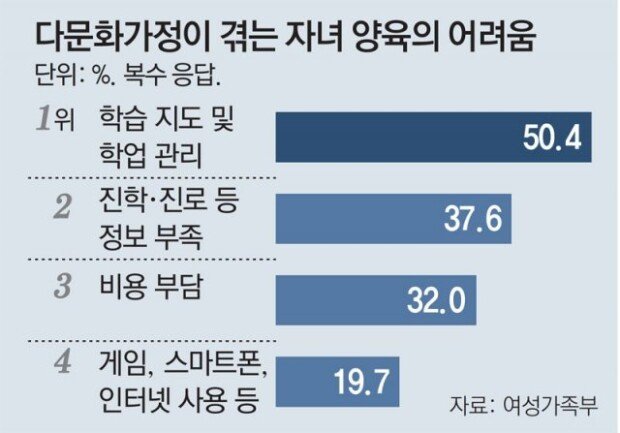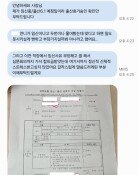Multicultural families are most worried about child education
Multicultural families are most worried about child education
Posted June. 28, 2022 08:01,
Updated June. 28, 2022 08:01

Nine out of 10 multicultural families in Korea with school age children experience difficulties, a survey says. While these families’ struggles from social discriminations or conflicts between the couples reduced as the number of such families grew, how to educate their children is becoming an increasingly concerning factor for the parents.
The Ministry of Gender Equality and Family (MOGEF) announced on Monday the results of “2021 Nationwide survey on multicultural family status’ today, which surveyed a total of 15,578 multicultural households living across the country. This survey was first started back in 2009 and is being conducted on three-year basis.
Among naturalized Korean citizens, including women immigrants by marriage who have a child aged six and older, 88 percent said they “experience challenges in child rearing.” The hardest part, they responded, is “difficulties in offering study guidance & academic support (50.4 percent)” followed by △ insufficient information on school choice/career path (37.6 percent) and △ Burden from the costs (32.0 percent), etc. (multiple answers included)
39.9% of the respondents have lived in Korea more than 15 years, a jump by 12.3 percent from 27.6 percent in 2018 survey. As the duration of living in Korea becomes longer, their concerns seem to have shifted to childcare. “Deep interest and actively involvement of parents are important parts in Korean education environment. However, immigrants by marriage often suffer challenges in the process in terms of relatively higher language wall and shortage in experiences and information about the schools in the country,” explained Kim Sook-ja, senior officer for family policy at the ministry. In fact, the statistics shows that only 40.5 percent of children from multicultural family pursue higher educations, including college, which is 31 percentage points less than that of entire Korean nations as a whole.
Nonetheless, the tendency of experiencing social discriminations and disputes between the married couple are declining. 16.3 percent of the respondents said they “have experienced discriminations because they are foreigners” during previous one year period from the survey time, which is 14.6 percent less than 30.9 percent in 2018 survey. Also, 46.3 percent said they “experience conflicts with spouse” during the one-year period, a drop from 61.8 percent in 2018.
ksy@donga.com
Headline News
- N. Korea launches cyberattacks on S. Korea's defense companies
- Major university hospital professors consider a day off each week
- Italy suffers from fiscal deficits from ‘Super Bonus’ scheme
- Inter Milan secures 20th Serie A title, surpassing AC Milan
- Ruling and opposition prioritize spending amid tax revenue shortfalls







